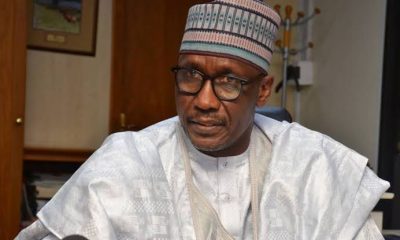Feature
New Minimum Wage: Negotiations Stir Anxiety and Hope

New Minimum Wage: Negotiations Stir Anxiety and Hope
By Halima Abdulkadiri
In Nigeria, the struggle for a new minimum wage has become a focal point of anxiety and hope for millions of citizens. With approximately 40 percent of the population living below the poverty line, according to the National Bureau of Statistics (NBS), and the recent removal of the fuel subsidy causing prices to skyrocket, the demand for a wage increase has become more urgent than ever.
The World Bank defines extreme poverty as living on less than $1.90 per day, a reality for about 83 million Nigerians out of an estimated 200 million. The removal of the fuel subsidy has exacerbated this situation, leading to a sharp rise in the cost of living. Official data indicates that inflation has surged to 33.69 percent, placing immense pressure on households.
Mrs. Shade Oguntoye, a civil servant in the Federal Capital Territory (FCT), exemplifies the daily struggles faced by many Nigerians. During a recent trip to the Area 2 shopping complex to buy plantains, she was shocked to find that a bunch cost N10,000. Unable to negotiate a lower price, she left empty-handed. Similar stories of soaring prices can be heard across the country. In Lugbe market, for instance, a tuber of yam now sells for between N3,000 and N3,500, while five tubers cost between N17,000 and N34,000. The price of meat has also increased dramatically, with one kilo now selling for N5,500, compared to N1,500 last year.
Mr. Ahmed Sanni, another civil servant, has seen his rent for a two-bedroom flat in Federal Housing Lugbe, Abuja, increase from N800,000 to N1.8 million. Since President Bola Tinubu removed the fuel subsidy on May 29, 2023, the unchanged minimum wage of N30,000 has left civil servants grappling with rapidly rising costs.
The latest NBS report highlighted a year-on-year food inflation rate increase to 40.66 percent in May 2024, up from 24.82 percent in May 2023. This rise is attributed to higher prices for staples such as Semovita, Oatflake, Yam flour, Garri, and Beans, among others. The monthly food inflation rate also increased by 2.28 percent in May, although this was a slight decrease from April’s rate.
Protests have erupted across Nigeria, with citizens demanding an end to hunger and hardship, and a reversal of the fuel subsidy removal. On social media, plans are being made for a large-scale protest on August 1, calling for reductions in the national assembly budget and the overall cost of governance.
Experts argue that raising the minimum wage could alleviate hunger by increasing workers’ purchasing power, allowing them to afford basic necessities. The Nigeria Labour Congress (NLC) and the Trade Union Congress (TUC) have proposed a new minimum wage ranging from N447,000 to N850,000, depending on the region, citing the severe impact of inflation.
Despite these demands, the federal government has rejected a proposal for a N62,000 minimum wage, which NLC President Joe Ajaero and TUC President Festus Osifo have criticized as insufficient. They insist that the minimum wage should be at least N250,000 to meet current economic realities. The tripartite committee, led by Alhaji Goni Aji, has urged labor to consider economic factors and non-monetary incentives provided by the government, such as a N35,000 wage award for federal workers and financial support for various sectors.
Public affairs analyst Mr. Samson Dauda attributes the widespread hunger and anger to food insecurity, exacerbated by the nation’s agricultural challenges. As President Tinubu leads negotiations with labor unions, Nigerians are hopeful for a resolution that will bring much-needed relief and stability to their lives.
New Minimum Wage: Negotiations Stir Anxiety and Hope
Feature
CBN’s Aggressive Monetary Policy Tightening and Its Impact on Nigeria’s Economic Growth

CBN’s Aggressive Monetary Policy Tightening and Its Impact on Nigeria’s Economic Growth
By Halima Abdulkadiri
Recently, Aliko Dangote, Chairman and CEO of Dangote Group, voiced concerns about the repercussions of rising interest rates on local manufacturers during the National Manufacturing Policy Summit organized by the Manufacturers Association of Nigeria (MAN) in Abuja. He emphasized that an interest rate of 30% would stymie job creation and economic prosperity, highlighting the critical link between affordable financing and economic growth.
Dangote’s remarks underscored broader apprehensions among stakeholders regarding the Central Bank of Nigeria’s (CBN) aggressive monetary policy tightening. At its 295th meeting in May, the CBN’s Monetary Policy Committee (MPC) increased the Monetary Policy Rate (MPR) for the third consecutive time to 26.25%, citing inflation control as its primary objective. Despite these efforts, Nigeria’s inflation rate surged to 33.95%, surpassing the CBN’s target and signaling persistent economic challenges.
Governor Yemi Cardoso of the CBN defended the rate hikes, attributing recent declines in month-on-month inflation to the bank’s stringent monetary stance. However, he acknowledged ongoing inflationary pressures, particularly in food prices, driven by transportation costs and security issues in agricultural regions.
Critics, including financial expert Prof. Uche Uwaleke and economist Dr. Chijioke Ekechukwu, argue that the aggressive tightening measures may be excessive, potentially stifling economic sectors like agriculture and manufacturing. They suggest a pause in further rate hikes to assess the impact on inflation transmission and overall economic stability.
Moreover, stakeholders such as Muda Yusuf of the Centre for the Promotion of Private Enterprise (CPPE) and economist Prof. Ken Ife express concerns about the mismatch between the MPR and inflation rates, which discourages private sector investment and affects economic growth prospects.
Former CIBN President Okechukwu Unegbu acknowledged the necessity of curbing inflation but cautioned against prolonged high interest rates, advocating for a balanced approach to address economic challenges effectively.
Looking ahead to the upcoming MPC meeting, scheduled for July 23, stakeholders hope for a recalibration of monetary policy to support economic recovery and stabilize the exchange rate. They emphasize the importance of policies that foster a conducive environment for business growth and job creation, particularly in critical sectors like manufacturing.
As Nigeria navigates its economic path, balancing inflation control with sustainable growth remains paramount. The decisions made by the MPC in the coming months will significantly influence Nigeria’s economic trajectory, shaping the environment for investment, job creation, and overall prosperity.
In conclusion, while inflation control is crucial, stakeholders urge the CBN to consider broader economic impacts and adopt nuanced policies that support both price stability and economic expansion. This approach is vital for navigating Nigeria’s complex economic landscape and ensuring inclusive growth across all sectors.
CBN’s Aggressive Monetary Policy Tightening and Its Impact on Nigeria’s Economic Growth
NAN
Feature
Nurturing Boy-Child to Save the Girl-Child

Nurturing Boy-Child to Save the Girl-Child
By Vivian Ihechu
In most cultures, especially in Africa, preference to the boy-child has strong cultural, religious, legal and of course, social status.
This is principally because a male heir is needed to continue the family line.
The boy-child, faced with many challenges, especially in the 21st century, is often times not properly guided; hence the society tends to be losing him.
The African Charter on the Rights of the Child defines a child as anyone below the age of 18; hence a boy-child is a male offspring below the age of 18 years.
Unlike the boy-child, the girl-child has received massive campaign for her rights and protection, with increasing mainstream attention in public health care from the early 2000s.
While several initiatives to protect the female gender have continued to emerge, those for the male are sparse.
The female-centered initiatives include, inter alia, the International Day of the Girl Child, and UN’s coordinated International Conference on Population and Development (ICPD), Cairo in 1994, and the 1995 Beijing Conference that highlighted concerns on women and girls’ empowerment and autonomy.
The initiatives also include laws and regulations against women trafficking and application of criminal laws to under-age sex, child-brides, and sex work
However, it is worthwhile to note that all children are future leaders of tomorrow and custodians of the future.
As such, the first aim of every family and society should be to raise healthy and productive individuals who are physically, psychologically, society and mentally well developed.
Analysts say that neglecting issues affecting the boy-child sets foundation for unbalanced male adult especially as he is the “father’’ of tomorrow, taking charge of families and females who leave their birth families after marriage.
Recognising the importance, the United Nations in 2018, adopted May 16 every year as the International Day of the Boy Child.
It was championed by Dr Jerome Teelucksingh, a university lecturer from the Republic of Trinidad and Tobago.
The day focuses on boys and their well-being, their needs to feel happy, healthy, and valued within family and community.
Dr Naeem Dalal, Advisor, Non-communicable Diseases, Injuries and Mental Health for Africa CDC, affirmed that boys were not taught to reach out for help; and this had detrimental effects.
“Men are supposed to be responsible and breadwinners in communities; showing that part of vulnerability is not something that is accepted in our communities across the African continent in general.
“And not just to stereotype it, but also to be factual that men are also taught not to be reaching out for help growing up as boys and boys are told to be strong and responsible.
“So, this also causes an issue for men to reach out for mental health services, even when they are there; they may end up committing suicide.
“These are the challenges we are facing; the boy-child is also human,’’ he said.
He advocated looking at mental health advocacy for communities, also in the direction of men’s health.
Commenting on the boy-child, Ms Ifeoma Ibe, a Counsellor, said that boys , in the African setting, were brought up to be macho and it was reiterated in the family, school and church.
“Some of the prototypes instilled in their minds are that the boy-child is stronger, usually more intelligent and more powerful than girl-child, and therefore, does not need protection as girl-child.
“He is not expected to express his emotions or any weaknesses; he is to bear things, good or bad, `like a man’.
“He is taught not to cry but always behave in a brave manner since boy-child is not to display their weakness; they tend to suffer in silence.
“Society teaches males that they must be in control all the times,’’ she said.
Mrs Vivian Emejuobi, a Wellness Specialist, advised parents to invest time in training their male children to become responsible adults.
“If the boy-child is properly groomed and nurtured, there will not be a girl-child abuse.
“This proper education will encompass how to treat the opposite gender and it will help to reduce rape and abuse cases in the society.
“So, the same energy that parents use to bring up the girl-child should be replicated in the upbringing of the boy-child.
“Massive advocacy and sensitisation is required to educate the boy-child to become better persons in the future,’’ she said.
A Nigerian author and novelist, Gbenga Sokefun, said that on human trafficking , efforts had been mostly on the girl-child.
According to him, the focus of these efforts has been primarily on female children, trafficked for purposes of prostitution and other forms of indentured servitude.
However, he called on leaders to also concentrate on human trafficking of the boy- child.
Sokefun, the author of a fiction, “Adigun”, said that trafficking of the African boy- child had received far less attention, despite the simple fact that it existed.
“The pressures of poverty and the inherent psychological damage of colonialism have resulted in a brisk trade of young African boys and men under the auspices of narcotics smuggling.
“The perpetrators have created a pathway for the African male child whose solution to the inadequacies of the continent is escape to the ‘greener’ pastures of the Americas, Europe or anywhere away from the continent of Africa.
“They prey on the dreams and desires of these gullible children who seek a better life on other continents.
“These should be tackled,’’ he said
Lending their voices, some clerics said that bringing up the boy-child properly is a social responsibility that parents cannot delegate to others.
Pastor Chris Nmezi of the Spoken Word Ministry, Ojo Barracks, Lagos, advised parents to conduct themselves in exemplary manners , such that the children would follow same.
He described parents that quarrel and batter each other in the presence of the children as mentally deforming the children.
Nmezi cautioned parents to discard uncomplimentary habits towards others especially their spouses to prevent children from coping habits that would portray them as never do wells.
“As gatekeepers whatever we condole or instill in the heads of the children by our actions or inactions that they will acquire.
“Any boy that grows up seeing her mother being beaten by his father will see it as a tradition to beat his wife later in life,” he said.
Sharing similar sentiments, Pastor Gladys Ododo urged parents not to do that which they would not be happy seeing their child indulge in.
Ododo said that parents especially men, indulge in drinking alcohol even around the home but would not like to see their children of school do same.
“It is hypocritical; if you don’t want them in it, then stop it; children copy with ease what they see parents do than what parents told them.
“Rising up voice at your spouse at every infraction or detestable conduct is sending wrong signal in the children and people around.
“If there is need to correct anyone do so courteously without attracting unnecessary attention,” she said.
As a way to help the boy-child, Mr Gaius Edem, a teacher, urged parents to encourage their boy-child to engage in exercise, extra curriculum activities such as belonging to a positive club.
“Parents, guardians and educators can encourage the boy-child to join positive clubs in schools or their religious gatherings.
“It will also help young and growing child to channel their time and energy to meaningful and healthy activities,’’ he said.
In her input, Mrs Rosita Agomuo, an Educationist and Executive Coordinator of Safe mamahood, agreed that boys had been relegated to the background, as all attentions were on the girl-child.
Agomuo said that the interest of boys should be protected because they are also victims of abuse.
“These abuses also affect boys psychologically but we do not always hear about it in the media; the focus has always been on the girl-child.
“I believe CSOs and NGOs need to do more for the boy-child too by focusing on their peculiar needs and challenges to achieve gender equality,” she said.
All in all, experts of the view that good training of a boy-child will help to achieve a safer world for the girls/women and humanity at large.
They say if well nurtured and groomed, the boy-child will conscientiously carry, just like the girl-child, the responsibility of fostering understanding, empathy and equality; thereby making a harmonious world for all.
Nurturing Boy-Child to Save the Girl-Child
Feature
Pelumi Nubi’s London-to-Lagos journey and West Africa’s border realities

Pelumi Nubi’s London-to-Lagos journey and West Africa’s border realities
By Mark Longyen & Tosin Kolade
When travel content creator Pelumi Nubi embarked on her 68-day solo journey from London to Lagos a few months ago, little did anyone anticipate the beauty, excitement, and challenges that would unfold.
She embarked on a journey from London through France, Spain, and Morocco before venturing into the West Sahara Desert.
From there, she continued her expedition through Mauritania, Senegal, The Gambia, Guinea-Bissau, Guinea, Sierra Leone, Liberia, Mali, Burkina Faso, Côte d’Ivoire (Ivory Coast), Ghana, Togo, Benin, and on the other end arrived in Lagos, Nigeria on April 7.
Pelumi made history as the first black woman to complete a solo drive from the United Kingdom to Nigeria, garnering accolades and recognition worldwide for her remarkable achievement.
Fans greeted her arrival with cheers, having closely followed her journey online.
In recognition of her extraordinary feat, the Lagos State government bestowed upon her a new car, a house, and an ambassadorship for state tourism.
While the journey progressed, the solo trip revealed the beauty, culture, and traditions of all the countries she visited.
However, a major highlight was the difficulty and delay in moving past the West African borders as a British-Nigerian citizen with the required travel documents.
Different passport checks, attitudes of border security officers, and seemingly deliberate delays, were shown on her social media page, Instagram, with millions of viewers.
According to Pelumi, she hopes to use her platform to create an awareness campaign for improving freedom of movement for people in the African region.
Pelumi is not alone in the narrative about the frustrating and agonising road-travelling experiences on the borders of member states by ECOWAS citizens.
Doris Brown, Deputy Secretary-General, Lions Club District 40382, comprising Liberia, Sierra Leone, Ivory Coast, and Togo, who experienced the same, urged Customs and Immigration officers to treat ECOWAS citizens, who cross the sub-regional borders by road with dignity and respect.
Like Pelumi, she said that 29 of the club’s members, while traveling to Togo by road from Liberia through Ivory Coast, and Ghana for their district convention, were subjected to agonizing hours of delays due to relentless searches at checkpoints.
According to her, by the ECOWAS protocols, people should travel freely without taking a visa from member states, as ECOWAS Heads of State have signed the protocols, so people should not be treated “inhumanly as if we came from space.”
“ECOWAS needs to have a second look at the relationship between its member states, especially with the ordinary citizen who embark on a journey by road.
“Each member state needs to ensure security, but as ECOWAS citizens, they should be accorded some respect and dignity.
“These were not part of the dreams of the founding fathers of ECOWAS for the ECOWAS citizens and Africa as a whole. If we cannot be respected at our borders and ensure free movement, what is the reason for having ECOWAS?” Brown queried.
Critics say that in spite of the signing of the African Continental Free Trade Area (AfCFTA) and the ECOWAS protocol on the free movement of persons and goods, challenges persist regarding the free movement of people and goods in the West African sub-region.
The free trade agreement, brokered by the African Union (AU) and signed in Kigali, Rwanda on March 21, 2018, aims to establish a single market for goods and services in Africa, promote the free movement of people, and drive economic growth and development across the continent.
With 54 signatories, the AfCFTA is the largest free trade area by member states after the World Trade Organisation, encompassing over 1.3 billion people and vast geographic regions.
It envisions provisions for visa-free travel, residency rights, and the absence of movement barriers, enhancing economic integration and regional cooperation.
While policymakers see labour movement as crucial to the success of the continental free trade agreement, not all African countries fully support the idea.
Additionally, alongside the AfCFTA agreement and the Kigali Declaration, 30 African nations signed the Protocol on Free Movement of Persons, aiming to establish a visa-free zone within AfCFTA countries.
The ECOWAS protocol on the free movement of goods and people promotes regional integration and economic progress among its member states.
The Protocol on Free Movement, Right to Residency, and Establishment, mandates member-states to allow ECOWAS citizens with valid documents the right of entry into their territories under the provisions of the protocols.
ECOWAS member states are also required to adopt measures to ensure that ECOWAS citizens enjoy to the full the rights granted in the Protocol.
Dr Matthew Ogali, a researcher from the Department of Political and Administrative Studies at the University of Port Harcourt, highlighted one of the objectives of ECOWAS as promoting trade and commerce among member countries.
He identified various institutional and non-institutional barriers hindering the free movement of people and goods, such as excessive customs checks and entry restrictions.
According to him, after forty-nine years of existence, ECOWAS has primarily thrived in the informal trade sector, characterised by small-time entrepreneurs conducting business across borders with minimal adherence to established trade policies.
Ogali noted that this informal trade environment has also fostered criminal activities like smuggling and cross-border armed banditry, resulting in significant losses of goods and, at times, lives.
“Despite its resilience over the past forty-nine years, ECOWAS has struggled to translate many of the documents produced by its intellectual community, often seen as scholarly discourse, into practical policy implementations.
“This gap between academic insights and policymaking poses challenges for addressing the region’s problems effectively.
Prof. Charles Ukeje of the Department of International Relations, Obafemi Awolowo University, OAU, Ile-Ife, while commenting on Pelumi’s experience at the borders of ECOWAS countries, said her challenges may have been unrelated to any deficiencies in the ECOWAS protocol on the free movement of its citizens.
He said: “One would not know whether she was carrying a British passport or a Nigerian/ECOWAS passport during the trip, which would have guaranteed her free movement, or otherwise, within the subregion in line with the ECOWAS protocol.
“Also, we need to know whether the passport she carried had expired or was invalid at the time she was traveling, which may have necessitated scrutiny by security officials at the borders.”
Corroborating Prof. Ukeje’s view, ECOWAS Director, Free Movement of Persons and Immigation, Albert Siaw-Boateng, said that the delay experienced by Pelumi at the points of entry or exit could not be attributed to any weaknesses in the implementation of the protocol.
He said that due to the prevailing security challenges in the region, triggered by terrorism and violent extremism, ECOWAS’ security architecture necessitated thorough checks on travelers by security officials without impeding the free movement of community citizens within the region.
According to him, the protocol also gives room for National Laws to take precedence, hence, there are inconsistencies in the implementation of the protocol by individual member states.
“It is also to be noted that even though all member states have signed up to the Free Movement Protocol, it gives room for National Laws to take precedence.
“In this regard, there are inconsistencies in the implementation of the protocol by Member States.
“So, any delay at the point of entry or exit cannot be attributed to weaknesses in the implementation of the protocol,” he said.
Dr Omar Touray, President of the ECOWAS Commission, speaking on the Free Movement Protocol recently, noted that: “Free Trade moves with Free Movement of persons and goods.”
ECOWAS Commission Headquarters, Abuja.
Touray said that ECOWAS had been implementing joint border posts, which brought together border officials of two neighboring countries to carry out joint operations, to ease cross-border crossing, which sometimes took cognizance of respective member states’ laws.
“We have built a joint border between Nigeria and Benin at the Seme-Krake border, and between Togo and Ghana at the Noepe-Akanu border. These border posts are now operational.
“There is another border post that has been made operational between Nigeria and Cameroon at the Ekok-Mfun area. This was financed by the African Development Bank,” he said.
The creation of the ECOWAS protocol on the free movement of persons and goods on May 29, 1979, to facilitate a borderless ECOWAS, is a cardinal scheme of the bloc’s integration programme, aimed at moving from an ECOWAS of states to ECOWAS of people.
The Protocol adopts the removal of roadblocks and security checkpoints on intra-ECOWAS international highways, the introduction of a single ECOWAS passport, and a Schengen-type visa for the community’s citizens, among others.
Experts say this has fostered regional integration and development by boosting citizens’ mobility, which has yielded multi-sectoral benefits and contributed to key developments in the ECOWAS subregion.
They emphasise that effective policy implementation and addressing institutional barriers will fully realise the benefits of regional integration in West Africa.
Pelumi Nubi’s London-to-Lagos journey and West Africa’s border realities
-

 Health5 months ago
Health5 months agoOnly 58,000 doctors renewed licence out of 130,000 registered doctors – MDCN
-

 Business1 year ago
Business1 year agoNew Rates: ‘I borrowed money to finance this business…’ – Petroleum Marketer cries out over Non-supply of products by the NNPCL
-

 Entertainment2 months ago
Entertainment2 months agoBBNaija Season 9: TAMI Duo Evicted After Low Vote Count
-

 Defence & Security1 month ago
Defence & Security1 month agoOrganisers Demand IGP’s Dismissal Over Fatal Protest Crackdown
-

 Defence & Security1 month ago
Defence & Security1 month ago“Defence Chief Praises Strong Inter-Service Cooperation for Operational Successes”
-

 Business2 years ago
Business2 years agoNew Naira Notes: We Have No Information On The Supreme Court Ruling – CBN
-

 Weather2 months ago
Weather2 months agoNiMet Forecasts 3 Days Thunderstorms, Rain Nationwide
-

 National1 month ago
National1 month agoNNPCL CEO Kyari Promises to Reveal Truth Amid Economic Sabotage Allegations


